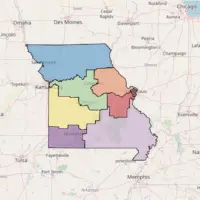
The Missouri NAACP sued to block lawmakers from meeting in a special session. Now that the special session has concluded, the lawsuit has become moot, the attorney for the state said
BY: RUDI KELLER
Missouri Independent
Gov. Mike Kehoe called a special session to redraw Missouri’s congressional map without a compelling reason, attorneys for the Missouri NAACP said Monday.
Therefore, they contend, the map passed by lawmakers should be declared void.
In the first of what promises to be extensive legal wrangling over the new maps, Cole County Circuit Judge Christopher Limbaugh heard arguments in a case that contends lawmakers should never have met at all. Filed by the NAACP as the special session began, attorney Sharon Jones argued Monday afternoon that the litigation should not be thrown out just because the session is already over.
There are, she said, questions that should be answered about the governor’s power to convene the legislature.
“We are in a position where new maps are going to have to be prepared, where legal challenges are already ongoing based on the legislation that passed,” Jones said. “The harms, because of what we believe to be an improperly called extraordinary session, continue to march, and that’s why we’re still seeking the preliminary injunction and the temporary restraining order.
Limbaugh did not rule immediately and did not estimate how long he would take.
Opposing the lawsuit, state Solicitor General Louis Capozzi said the case should be dismissed as moot because the legislature has met and adjourned. If that isn’t enough to dismiss the case, he said, the inherently political nature of a special session decision gives the governor broad discretion.
The Missouri Constitution says the governor can call lawmakers into session on “extraordinary occasions” after naming the items “on which action is deemed necessary.”
“Plaintiffs want this court to second guess the governor on what constitutes an extraordinary occasion,” Capozzi said. “There’s no precedent to guide the court on that open-ended inquiry, no cases at all. It’s an inherently political and policy focused decision, and without any precedent to guide the court, the court should not start down that path.”
Over 10 days ending Friday, the General Assembly met and passed two bills responding to Kehoe’s call to revise congressional maps and pass a proposal making it harder to pass constitutional amendments by initiative petition.
The revised congressional district map is intended to flip the 5th District, currently held by U.S. Rep. Emanuel Cleaver, a Kansas City Democrat, to Republican control.
Barring court action or a referendum petition to delay it, the new maps will take effect Dec. 11 and be used for elections in 2026. The proposal on initiatives will be on the November 2026 ballot unless Kehoe designates it for an election at an earlier date.
The NAACP lawsuit initially sought to block the legislature from meeting at all. Now the civil rights organization is asking that the legislature’s actions be declared invalid.
Jones admitted that no court has ever done what the NAACP is asking Limbaugh to do.
“There have been some cases that are about how far the legislature can go under (during a special session) but not how far the governor can go,” she said.
Along with the NAACP lawsuit filed as the session began, two additional lawsuits have been filed since the General Assembly adjourned. Both challenge the constitutionality of revising congressional district lines other than immediately after a federal census.
One, filed in Jackson County, alleges that lawmakers put the same Kansas City precinct into two districts, “creating a map that is malapportioned and/or noncontiguous.” The other, filed in Cole County, challenges the new map by questioning the power of the legislature to act between censuses.
The NAACP filed an updated petition Sunday, recognizing that the legislature had already met and adjourned after passing the bills Kehoe wanted.
“The court should require a minimum showing of some set of circumstances or events outside of the normal course of business to justify the convening of the legislature in an extraordinary session,” the revised filing states.
All the main questions raised by the NAACP are moot and the validity of the legislation is being tested in other courts, Capozzi wrote in a filing to the court seeking dismissal of the lawsuit.
And, he noted, the redistricting power is not limited to a particular time by the Constitution.
“Nothing prohibits the General Assembly from adopting a new federal congressional map mid-decade,” Capozzi wrote. “The Missouri Constitution is simply silent on that question. And where the Missouri Constitution is silent on a challenged legislative power, the General Assembly has the discretion to act.”
The question of whether a governor can call a special session is not purely political, Jones said.
“We are not talking about a question that is purely one of discretion,” Jones said. “We are talking about a question of how far does constitutional authority go.”


